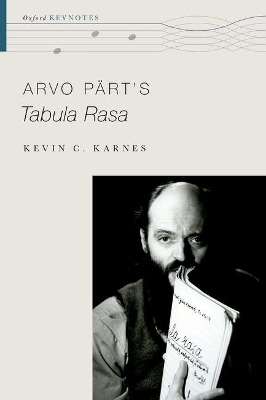
Arvo Pärt's Tabula Rasa
Seiten
2017
Oxford University Press Inc (Verlag)
978-0-19-046897-2 (ISBN)
Oxford University Press Inc (Verlag)
978-0-19-046897-2 (ISBN)
The first book dedicated to the breakthrough work by one of the most acclaimed composers today, Arvo Pärt's Tabula Rasa tells the story of its composition and premiere against the backdrop of late Soviet culture and the end of the Cold War.
One of today's most widely acclaimed composers, Arvo Pärt broke into the soundscape of the Cold War West with Tabula Rasa in 1977, a work that introduced his signature tintinnabuli style to listeners throughout the world. In the first book dedicated to this pathbreaking composition, author Kevin C. Karnes tells the story of Tabula Rasa as one of Pärt and of Europe itself, traced over the course of a quarter-century that saw momentous transitions in European culture and politics, history and memory. Beginning at the site of the work's creation in the Estonian SSR, and drawing extensively upon a range of previously unexamined archival materials, Karnes recounts Pärt's discovery of tintinnabuli amidst his experiments with the music of the Western and Soviet avant-gardes. He examines Tabula Rasa in relation to modernist conceptions of musical structure, the ascetic practice of Orthodox Christianity, postwar experiences of electronic music, and the polystylistic approaches to composition that have become emblematic of the Soviet 1970s. Tracing the export of Tabula Rasa to the West and Pärt's emigration in 1980, the book reveals intersections of critical commentary with visions of the "end of history" that attended the collapse of European communism to suggest that it was in this confluence of listening, discovery, and geopolitical reordering that enduring lines of conversation about Pärt and his music took shape.
One of today's most widely acclaimed composers, Arvo Pärt broke into the soundscape of the Cold War West with Tabula Rasa in 1977, a work that introduced his signature tintinnabuli style to listeners throughout the world. In the first book dedicated to this pathbreaking composition, author Kevin C. Karnes tells the story of Tabula Rasa as one of Pärt and of Europe itself, traced over the course of a quarter-century that saw momentous transitions in European culture and politics, history and memory. Beginning at the site of the work's creation in the Estonian SSR, and drawing extensively upon a range of previously unexamined archival materials, Karnes recounts Pärt's discovery of tintinnabuli amidst his experiments with the music of the Western and Soviet avant-gardes. He examines Tabula Rasa in relation to modernist conceptions of musical structure, the ascetic practice of Orthodox Christianity, postwar experiences of electronic music, and the polystylistic approaches to composition that have become emblematic of the Soviet 1970s. Tracing the export of Tabula Rasa to the West and Pärt's emigration in 1980, the book reveals intersections of critical commentary with visions of the "end of history" that attended the collapse of European communism to suggest that it was in this confluence of listening, discovery, and geopolitical reordering that enduring lines of conversation about Pärt and his music took shape.
Kevin C. Karnes is Professor of Music at Emory University. He is the author of A Kingdom Not of This World: Wagner, the Arts, and Utopian Visions in Fin-de-Siècle Vienna (Oxford University Press, 2013) and Music, Criticism, and the Challenge of History (Oxford University Press, 2008).
Acknowledgments
About the Companion Website
Note on Archives and Sources
1. The Blank Slate
2. Unofficial Music: A History for Pärt
3. Tintinnabuli
4. Tabula Rasa: Listening, Reading
5. Export and Emigration
Sources for Further Reading and Listening
Index
| Erscheinungsdatum | 29.01.2018 |
|---|---|
| Reihe/Serie | Oxford Keynotes |
| Zusatzinfo | 10 halftone, 14 line |
| Verlagsort | New York |
| Sprache | englisch |
| Maße | 213 x 145 mm |
| Gewicht | 289 g |
| Themenwelt | Kunst / Musik / Theater ► Musik ► Klassik / Oper / Musical |
| Kunst / Musik / Theater ► Musik ► Musiktheorie / Musiklehre | |
| Geisteswissenschaften ► Geschichte ► Regional- / Ländergeschichte | |
| ISBN-10 | 0-19-046897-1 / 0190468971 |
| ISBN-13 | 978-0-19-046897-2 / 9780190468972 |
| Zustand | Neuware |
| Haben Sie eine Frage zum Produkt? |
Mehr entdecken
aus dem Bereich
aus dem Bereich


